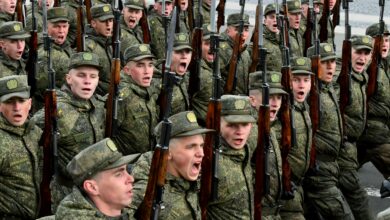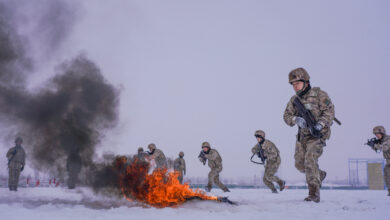Turkey to develop its own air defense missile system with Eurosam, Canikli says
Defense minister also says deal with Russia for S-400 air defense system has been completed
Turkish Defense Minister Nurettin Canikli said Turkey agreed with Europe’s manufacturer of air defense systems to develop its own missile system.
Canikli said the government’s goal is to work with Eurosam to develop an air defense system and to own the technology with Turkey’s “own local resources.”
“Turkey made the preliminary agreement with countries in Eurosam consortium to develop, manufacture and utilize an air defense system to increase its national defense capacity in the long term,” Canikli said on Saturday.
On Wednesday, Canikli signed a letter of intent with the defense ministers of France and Italy, paving the way for Turkey’s purchase of Eurosam SAMP-T launcher systems and Aster 30 surface-to-air missiles.
S-400 purchase “final”
Canikli also confirmed that Turkey had purchased the Russian S-400 anti-missile air defense system, without providing details on pricing and the number of batteries purchased. “That work is final. S-400 missiles were purchased. [We have to] work out only details,” Canikli said.
The purchase caused alarm among NATO members when an advance payment was made in September because the weapons are not interoperable with NATO defenses. In October, Foreign Minister Mevlut Cavusoglu said Turkey could cancel the deal for Russian S-400 Triumf air defense missile systems if Moscow refused technology transfer.
“We wanted to get it from NATO member countries, but failed to get the necessary support from the U.S.,” Turkish Prime Minister Binali Yıldırım said during an official trip to the United States earlier this week. “The fact that we have entered such a defense cooperation with Russia does not diminish our obligations or significance as a NATO member.”
“The U.S. and NATO countries should carefully consider why we have had to resort to this path,” Yildirim said. “We have no intention of giving up on NATO. We needed to move toward such a cooperation with Russia just to obliterate the threats against Turkey in the short term,” he added.
Now that Turkey has purchased the S-400, it says it is looking forward to developing its own indigenous anti-missile air defense – a longstanding Turkish ambition.
Canikli said Ankara would continue developing its own missile system despite the S-400 purchase and that Turkish officials are working with Eurosam in this regard.
Turkey lacks long-range missile defenses
Despite sitting adjacent to hotspots in the Middle East, NATO’s only Muslim member Turkey doesn’t have a sophisticated long-range air defense system. Over the past four years, NATO deployed up to six Patriot missile defense batteries to protect Turkey’s southern border against missiles fired from Syria.
Yıldırım said some countries “test their new weapons” in Syria, and that Turkey was unable to destroy 71 missiles fired on Turkey. “We have lost 29 civilians because of those missiles. We must protect our land,” he said.
Since 2012, Turkey has been in talks with U.S., European, Russian and Chinese manufacturers to purchase air defense systems.
In 2013, after foreign manufacturers proved unable or unwilling to share technology with Turkey, Ankara agreed a $3.4 billion deal with a Chinese state manufacturer – China Precision Machinery Import-Export Corporation – to develop Turkey’s first long-range air and missile defense system. Turkey cited reasons such as favorable technology transfer, a lower price, and earlier delivery.
The sale was dropped in November 2015 after pressure from NATO.
In September 2016, Turkey was reportedly in talks with Eurosam about the SAMP-T launcher system and Aster 30 missiles. Eurosam was favourable to joint production, technology transfer and partnership with Turkish defense industry firms.












